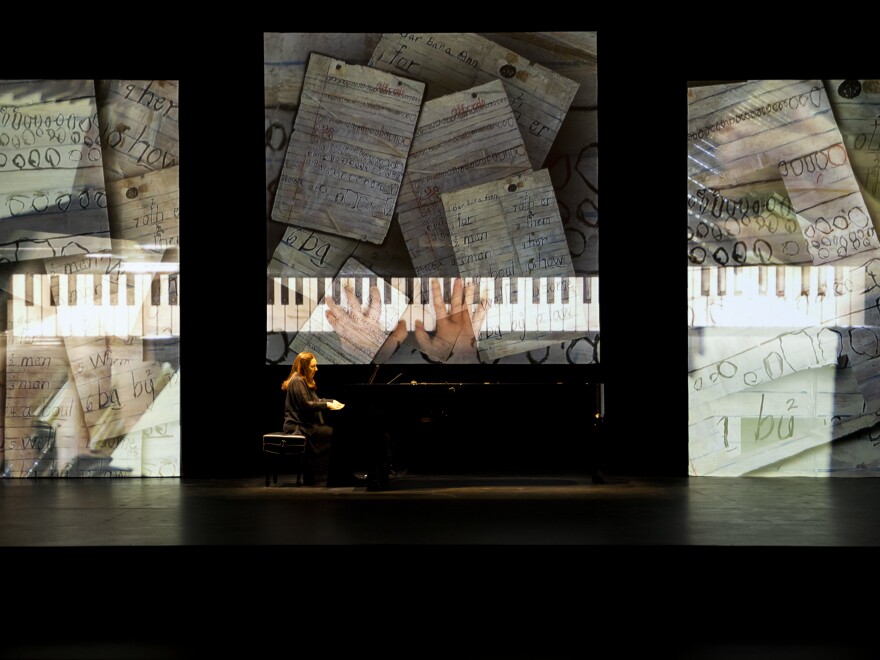Most of us have snapshots of ourselves as infants. But pianist Simone Dinnerstein has a different kind of baby picture. Her father, Simon, included her, sitting on her mother's lap, in The Fulbright Triptych, an enormous 14-foot-wide painting. That 1974 masterwork is at the center of a new multimedia performance piece devised and directed by the pianist: The Eye Is the First Circle premieres at Montclair State University in New Jersey on Thursday.
Dinnerstein lives in a house in Brooklyn, not far from where she grew up. During a recent interview, we sat at her dining room table, with a large replica of The Fulbright Triptych behind her – her infant-self looked over her right shoulder. It was all very meta.

The painting looks almost like a Renaissance altarpiece, "except instead of having the baby Jesus in the central panel, the central panel is all about the creation of a work of art and has a copper plate in the middle," Dinnerstein says. "That is what my father was engraving at the time that he started working on this painting. My parents and I are on either side of this central panel that is devoted to art. And that's really how I was raised, in that the most important thing really was art." Within the triptych are other works of art: postcards of paintings, photos, literary quotations, children's drawings.
While Dinnerstein is well known for her piano recitals, she has also created performances that venture beyond the bounds of conventional concerts. She recently performed An American Mosaic, a substantial work by composer Richard Danielpour, within a walking tour of Brooklyn's Green-Wood Cemetery, with four pianos scattered along the route. On Tuesday, Columbia University's Miller Theatre will stream a new video recital featuring a performance of that same composition.
Here, Dinnerstein wanted to make an evening that explored her own relationship to her father's painting, which is both a family heirloom and a public work of art. "I knew that I wanted to address aspects of the painting that were meaningful to me, having to do with family and inspiration," she explains, "and I guess a sense of spirituality that I feel that the painting reflects."
A few years ago, she approached Jedidiah Wheeler, executive director of the Peak Performances series at Montclair State University, with the idea, and he commissioned her. "What captured my imagination," Wheeler says, "was the possibility that an artist of one particular and indisputable discipline, expertise in piano, wanted to step out of that."
Wheeler introduced Dinnerstein to Laurie Olinder, a visual artist, to create projections and animations based on the painting. Olinder says she spent two and a half hours on a ladder in front of the triptych with her camera, capturing "every single detail of the painting," she explains. "Multiple ones of each of the little postcards and the landscape. I even took movies of just moving the camera across the painting."

Olinder's visuals, projected on three screens behind Dinnerstein at the piano and at times on a scrim in front of her, focus on various elements of the painting, while the pianist plays Charles Ives' "Concord" Sonata. The piece is in four movements, devoted to the American writers Ralph Waldo Emerson, Nathaniel Hawthorne, Bronson and Louisa May Alcott and Henry David Thoreau.
The music ranges from spiky and difficult to simple and beautiful. Dinnerstein says the Ives piece feels much like her father's painting: "That's the musical kind of equivalent; a huge, ambitious piece of music that is striving to somehow, through the abstract medium of text-less music, to emulate the philosophies of various transcendentalist writers."
The audience sometimes will see a live feed of Dinnerstein playing from the inside of the piano, captured with tiny spyware cameras placed in the soundboard. At other times, they'll see images of the pianist walking in the garden of her childhood home.

"It's so much more creative than the average piano recital," Dinnerstein says. "I felt like I just wanted to break out of this constraining shell of the recital and be able to do something more vibrant and more dimensional."
The entire triptych is seen only in the work's final movement. The manipulation of the painting creates some of the more emotional moments in the presentation. While Dinnerstein says she reveres and loves her father's creation, "One of the things that I've always been bothered by was the fact that my father is on one side and my mother and I are on the other side, and we're separated by art," she explains.
"I just wanted them to be sitting next to each other," Dinnerstein elaborates. "I asked Laurie, 'Can we do that? Can we bring them next to each other?' And she said, 'Yes.'"
So, on a large screen behind the pianist, Olinder has assembled visuals of the nuclear Dinnerstein family, seated together as if to listen to the pianist perform. And in what will amount to an even more meta moment, Simone Dinnerstein's parents, now in their late seventies, will be sitting in the audience at the premiere of The Eye Is the First Circle.
Copyright 2021 NPR. To see more, visit https://www.npr.org.



